Selecting appropriate medical options between illness and injury recovery becomes essential for personal and relative care. Household care services and hospice care pose a delicate choice for families who need home-based essential patient care services. The two types of care differ extensively through their operational approaches and end objectives.
What is home health care? Through medical home care services, it assists patients in their recovery process and rehabilitation to regain independence. Hospice care makes service quality and life comfort the main focus for clients who have a fatal illness.
People need to comprehend the difference between hospice and home health to make educated selection choices for their families. The following guide investigates the benefits and insurance coverage for these services, together with key situations when to pick one over the other.
Home Health: Focus on Recovery
What Home Health Offers
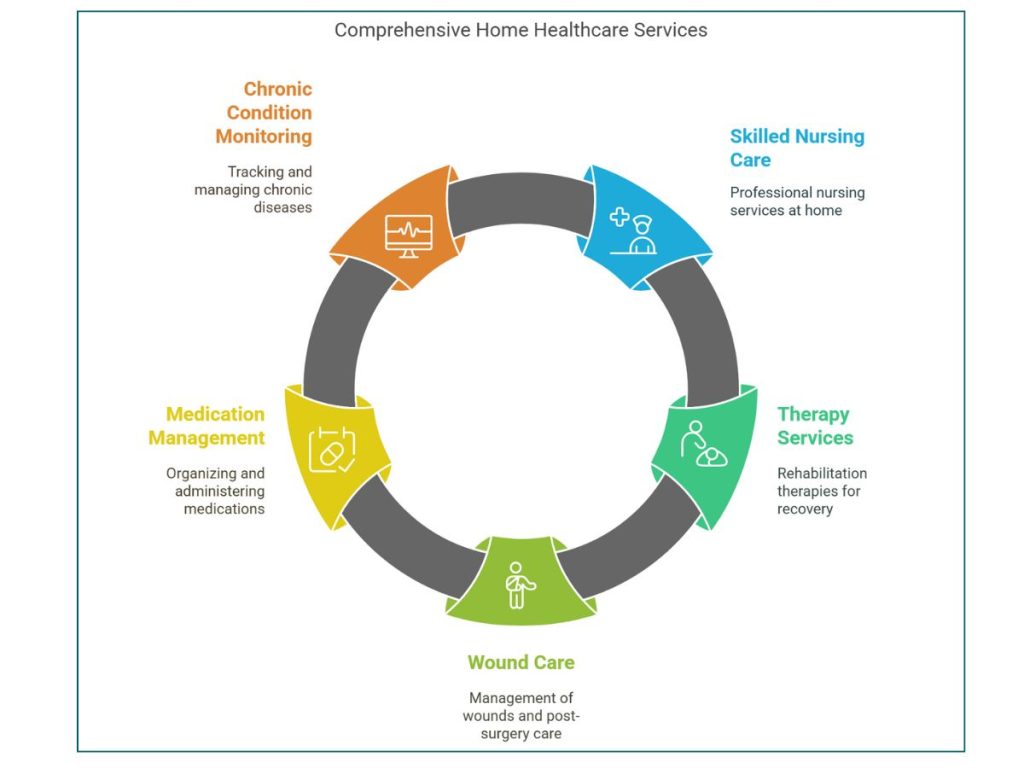
Home healthcare exists to serve recovery patients who need medical care following surgery, illness, or injury while they opt for home healthcare instead of hospitalization. Home health care services provide:
- Skilled nursing care from a home health care nurse
- Physical, occupational, and speech therapy
- Wound care and post-surgical recovery
- Medication management and injections
- Monitoring of chronic conditions like diabetes or heart disease
Medical professionals provide treatment to help patients recover their independence and avoid hospital returns.
How Long Does Home Health Last?
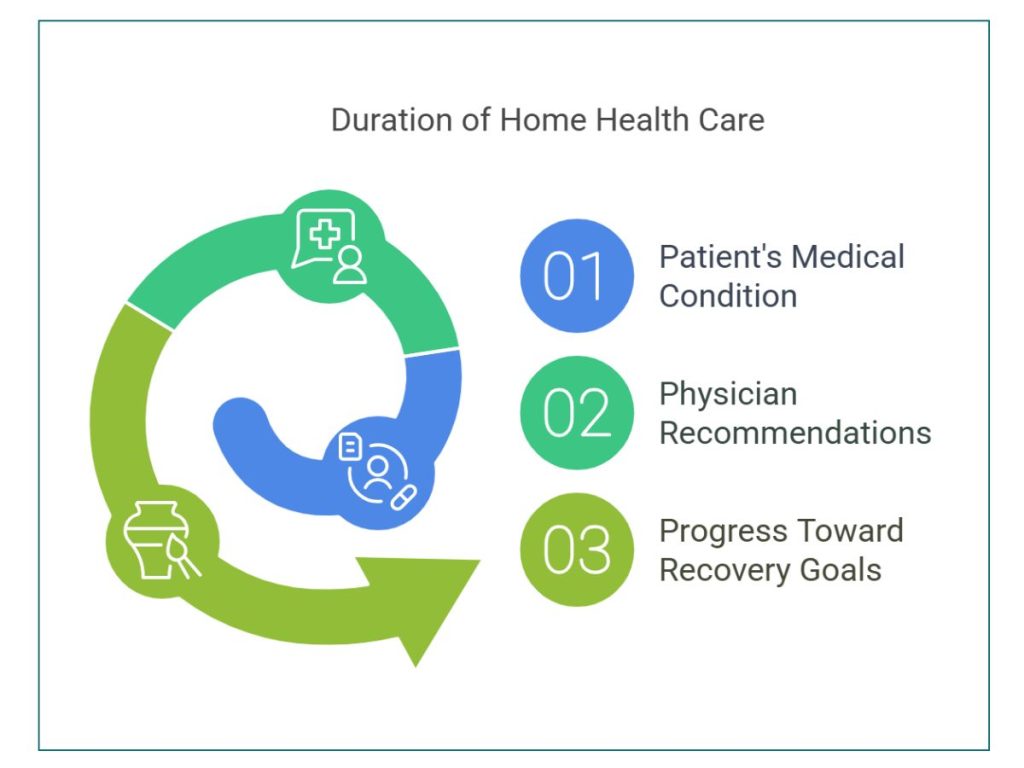
TThe duration of home health care remains active until patients demonstrate sufficient improvement in their health condition. The duration depends on:
- The patient’s medical condition
- Physician recommendations
- Progress toward recovery goals
The period of medical home care treatment usually extends between three weeks to various months based on average patient statistics. Home health services stop when patients acquire sufficient self-care capabilities either alone or assisted by limited help.
Does Medicare Cover Home Health Care?
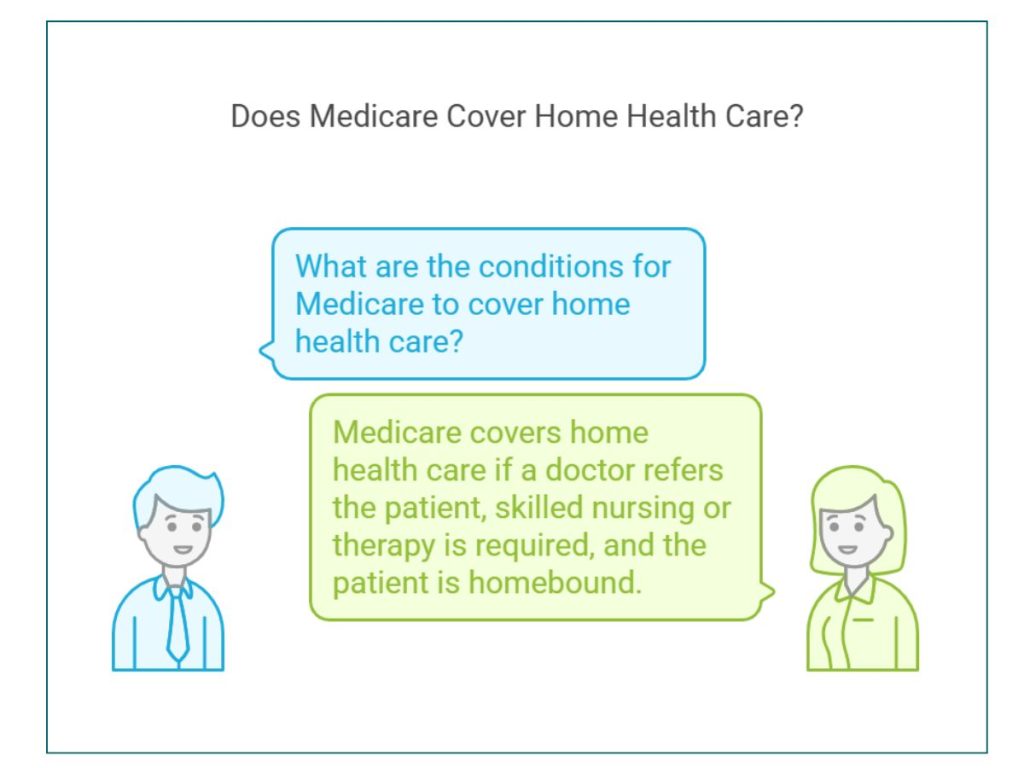
MMedicare and home health care coverage becomes available to patients who fulfill these three conditions.
- A doctor’s referral is required before starting home health service.
- Requires skilled nursing or therapy
- A person meets the requirement for homebound care when leaving the house requires help from others.
Home care services receive Medicare reimbursement for nursing care, therapy, and medical supplies, yet the program does not fund non-medical personal assistance for bathing and meal preparations.
Hospice: Focus on Comfort
What Hospice Offers
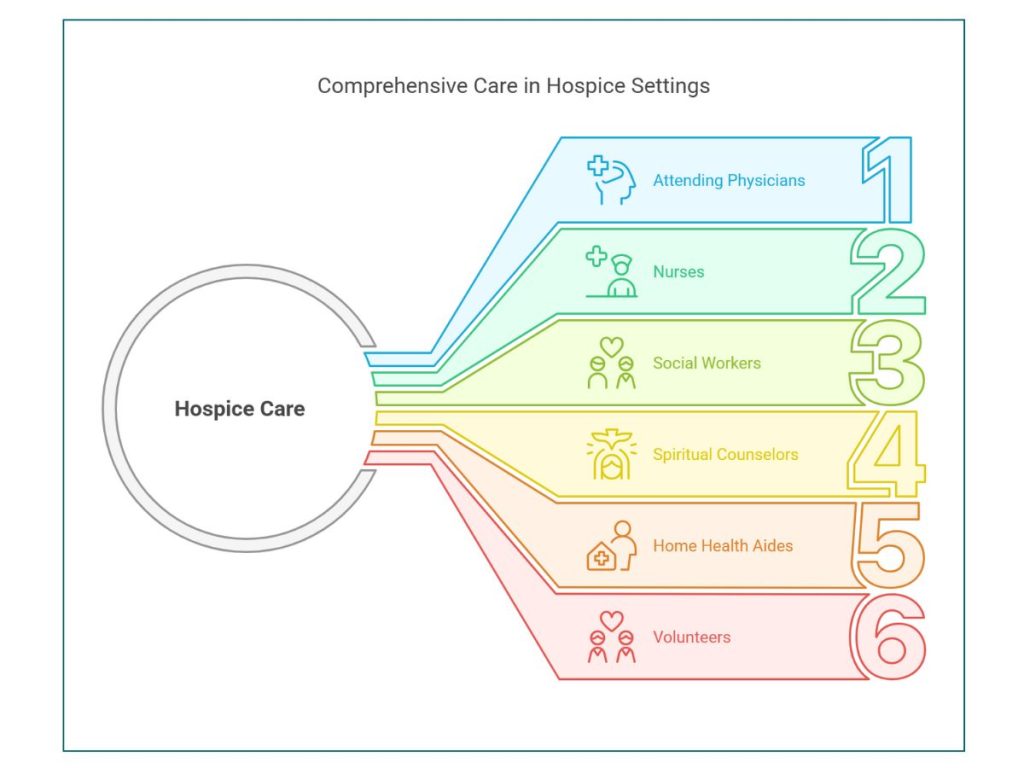
The main goal of hospice care lies in offering sympathetic care and support to terminal patients who have a life expectancy of six months or less. Hospice does not work towards healing the illness because it focuses instead on supporting comfort and dignity. Hospice caregiver teams include:
- Attending physicians, together with nurses, deliver pain management alongside symptom care.
- Social workers offering emotional support
- Spiritual counselors addressing spiritual needs
- The hospice provides home health aides who help patients with their daily life needs.
- Volunteers providing companionship
Patients receiving hospice care have the service option to stay at home or a nursing facility or receive care at a hospice center.
What Makes Hospice Different from Home Health?
The primary distinction between hospice care and home health service occurs through their distinct objectives.
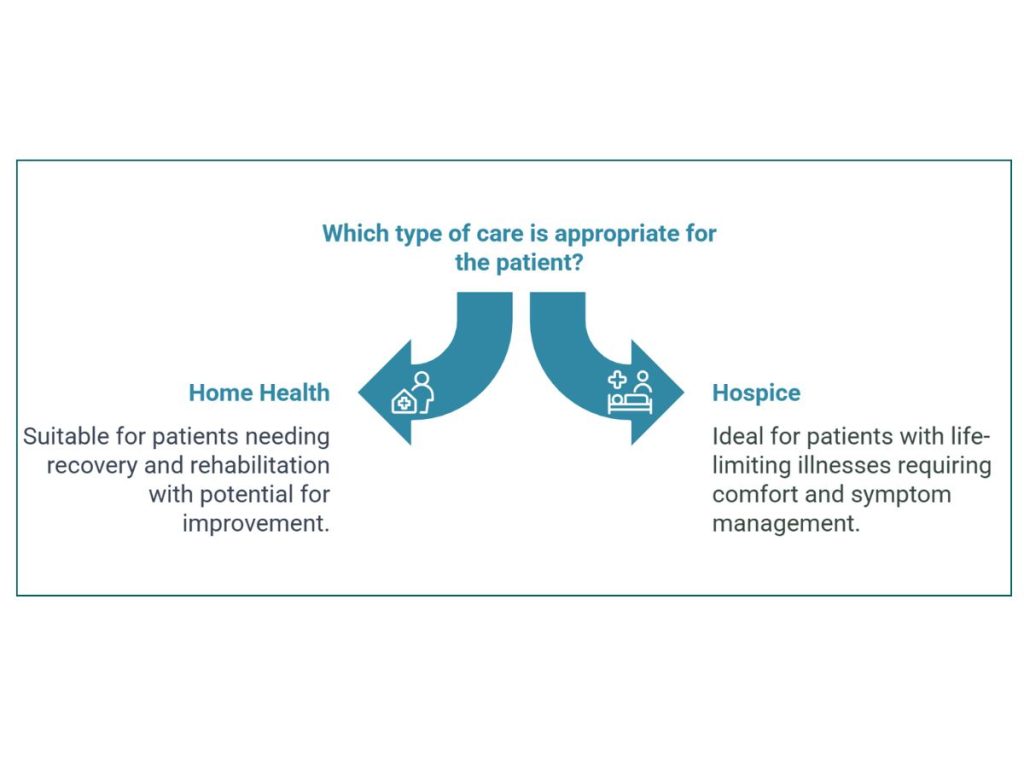
| Feature | Home Health | Hospice |
| Goal | Recovery and rehabilitation | Comfort and symptom management |
| Eligibility | The patient must show improvement | The patient has a life-limiting illness |
| Covered by Medicare | Yes, if skilled care is needed | Yes, for hospice-related conditions |
| Length of Care | Temporary (weeks to months) | Ongoing (as long as needed) |
The hospice patient population receives only comfort measures because treatment for their illness is now inactive.
What Is Not Covered Under Hospice?
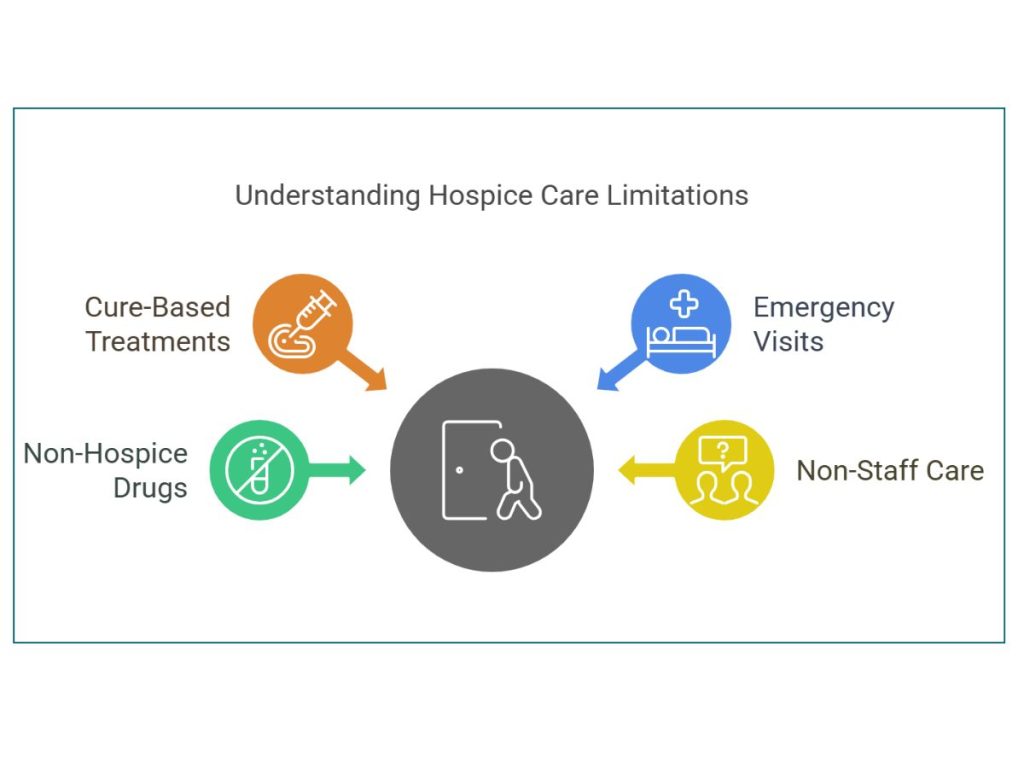
The patient care services at home covered by Hospice exclude certain healthcare costs such as:
- Cure-based treatments do not belong in the hospice treatment plan
- The use of emergency hospital visits when these trips do not pertain to hospice treatment care
- Prescription drugs for non-hospice conditions
- The hospice team does not cover care provided by healthcare providers who are not part of its staff unless they specifically make arrangements.
People receiving hospice care and their families need to comprehend the specific restrictions that come with this kind of care.
How They’re Similar
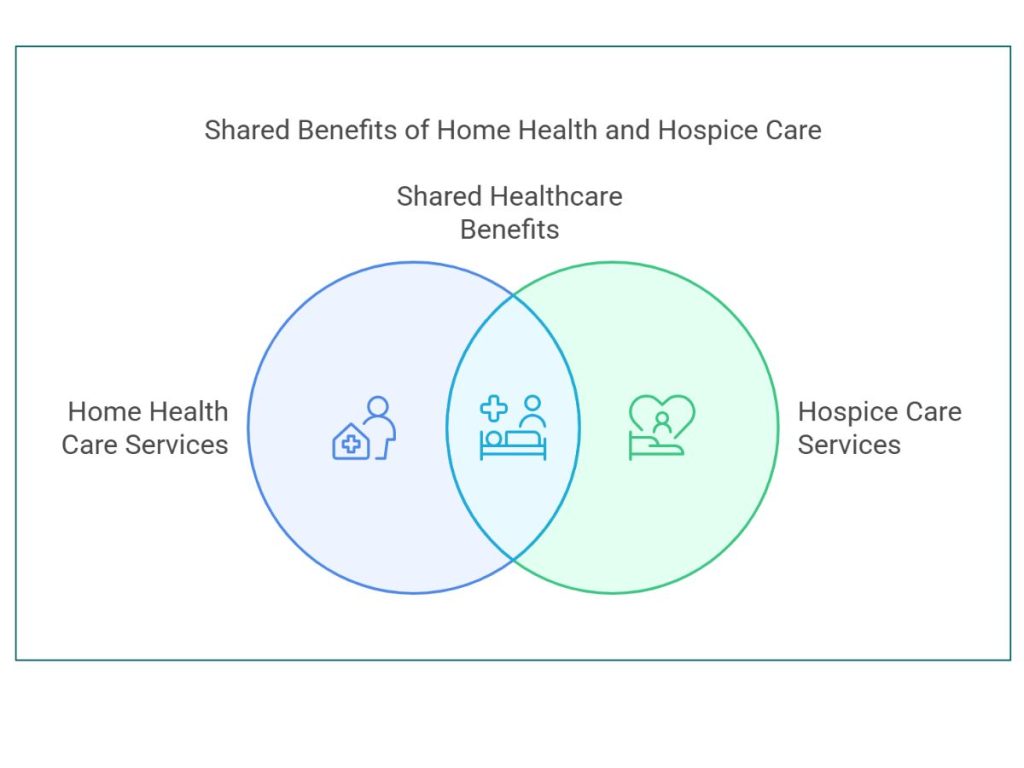
Despite their differences, home health care services and hospice care share similarities:
- Both offer health care at home for convenience and comfort.
- The provision of care requires skilled nurses, together with therapists and caregivers, to work with patients.
- A physician must refer patients for Medicare to receive coverage benefits from both treatment methods.
- The two systems work to deliver customized health services that address unique patient requirements.
The two health services operate in distinct phases of patient health progression.
When to Choose Hospice

The decision to choose hospice caregiver support presents itself as a major challenge to many. The following signs indicate that hospice support should be considered:
- The patient does not improve after receiving various medical treatments.
- The patient needs multiple hospitalizations along with frequent emergency department treatments.
- The patient prefers to concentrate on life quality instead of pursuing aggressive medical care.
- Hospice treatment demands regular maintenance of both symptoms and pain.
During the final months of life, hospice services deliver complete wellness assistance to patients and their loved ones while maintaining quality dignity and comfort in their care environment.
Read more at – Planning for Hospice Care: A Comprehensive Guide
Conclusion
Selecting between receiving home health care services or hospice care proves to be an extremely challenging decision process. People who receive home health services recover better, but those under hospice caregiver services receive respectful palliative care at the end of their lives. Abundant Hospice Care comprehends all the emotional hurdles people face when deciding about care options. The team aligns support services with individual needs while providing expert professional advice to each patient. For guidance regarding the most suitable care option, please contact our team right now. Many others experience this same challenge, which we will help you navigate together.
FAQs
1. What is home health care, and who qualifies for it?
The medical home care services delivered by home health care assist patients who need recovery help after surgery, illness, or injury. Patients can qualify when they need qualified nursing or therapy, but their doctor must issue a referral for this care.
2. How do I know if my loved one needs hospice care?
The best option in cases of terminal illness with ineffective treatment is hospice care. The main indicators that a person needs hospice care include repeated hospital stays combined with worsened pain symptoms and physical well-being decline.
3. Can a patient switch from hospice to home health care?
Hospice patients who demonstrate medical advancement can subsume hospice treatment to take home health care nurse services for their healing journey.
4. Does Medicare cover both home health and hospice care?
Eligible patients receive skilled nursing care and therapy benefits through Medicare home health care coverage. The Medicare health insurance system provides complete coverage for end-of-life care services, such as hospice care, to people diagnosed with terminal illnesses.
5. What are the costs of home health and hospice care?
Under Medicare, most home care services receive coverage, along with the costs of hospice caregiver services. Some medical treatments and medicinal prescriptions may require patients to pay additional costs. Additional support for costs can come from private insurance.
6. Can hospice care be provided at home?
Home services are a typical feature within hospice care programs. Hospice services are available to patients who stay in their homes, those in nursing facilities, and those in hospice centers.
7. How long does home health care last?
Medical home care services continue until the patient makes sufficient progress in recovery. The duration of care through services extends from weeks to months, depending on how well the patients recover.
A person must carefully weigh the options between home-based healthcare solutions and complementary services for hospice caregivers. Abundant Hospice Care exists to provide clarity through expert guidance and comfort to patients. Please reach out to us now to learn more about our attentive healthcare services.







